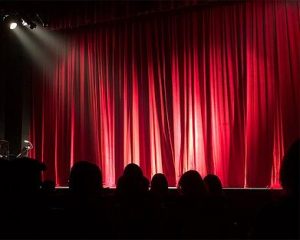This is by Sun News Editorial writer Conlan Salgado
Theatre is not dead, but it is dying. In thirty years, cultural critics may have the unhappy duty of asking about the Theatre, “What was the cause of its death?” In this present time, the same question must be asked in a different form: “What is the cause of its dying?” That the Theatre is dying is, I hope, not at all a contentious observation; Musicals are the most highly attended form of live Theatre, and yet the attendance of Musical Theatre is by no means astronomical. There is a tedious list of discouraging statistics, but here I will provide only a single one: 96% of the American populace never attends a Musical. Even less of this percentage patronize non-musical stage plays. The Theatre is dying. Or perhaps the proper way of saying it is that the Theatre is a house of relics, and those relics are rapidly going extinct. Even in Britain the Theatre is not so highly attended, though it retains an eminence the American Theatre does not. The British Theatre will undoubtedly survive longer than the American Theatre, if only because it possesses Shakespeare. Anyway, I hold the belief that anything, or any pursuit, will lose its eminence or widespread use if it fails to serve its purpose. Since the Theatre is a pursuit, the most sensible point at which to begin this exploration is by asking: What is the purpose of Theatre? The purpose of Theatre is to show us life. The Theatre portrays simple life in the sense of allowing us to understand human beings and human situations. Of course, the Theatre must be messy (as it always has been) because human life is messy, but the Theatre need not be bigoted, as it now is. The Theatre does not show us life now, it shows us what a certain group of people consider life should be, or what life has been as ideology. Theatre is not life now, it is politics; it is not the politics of life; it is the politics of people, and only some people at that. The Theatre is a leftist organization. That point is not disputable, but what is disputable is whether such a Theatre is good or bad. Allow me boldly to say though that the Theatre should not be any “type” of organization: It should not be a Rightist organization, a liberal, a conservative, a religious, or a non-religious organization. It should not be a social justice organization. It should not be an organization established to challenge the status quo, and it should not be an organization of compassion or kindness. The Theatre should be life, and life is none of those things, and life cannot be made into any of those things. At the best concession, life could be called an amalgamation of all aforementioned principles. The Theatre espouses only one or two of those principles (though it believes it espouses much more). The modern Theatre should really be named the Theatre of ideology. Strindberg, Brecht, and Ibsen created this modern Theatre of ideology, and apparently the modern artistic world could not resist taking it up. Some later playwrights did not, such as Tennessee Williams and even Arthur Miller, whose hobby was the Theatre of ideology, but whose main occupation was the Theatre of life. Chekov at the turn of the last century rejected the Theatre of ideology and dedicated himself instead to the Theatre of psychology and prophecy, which are both departments of the Theatre of life. But returning to the Theatre of ideology, its ideas are very simply encapsulated: the modern Theatre does not portray life; it portrays a certain ideological outlook on life. And still more simply, people who do not agree with the ideology of the modern Theatre will never attend the Theatre. Some may say, however, that this is really not the cause of a dying Theatre for a multitude of people attend the movie theatre and movies certainly contain extreme ideological biases. This is true, but the movies are much more of an escapism mechanism than is the Theatre. Furthermore, not all movies are well attended; the most highly watched movies are massive action thrillers, which contain, even in this age, far more escapism than ideology. The Theatre does not offer escapism, nor does it offer confrontation, which is its more proper office. Life is reality, and reality is always confrontational, which is why confrontation is the function of Theatre (in fact, Theatre of confrontation is the greatest department of the Theatre of life). As I say, Theatre does not confront people; it jumps people from behind and shoves its message distastefully down people’s throats. It is a truth that when people are not confronted with reality, they are content to escape from it. You see, it is against the will of human beings, generally, to seek out a confrontation of reality. Most people spend a copious amount of time running from reality. Theatre is an exalted pursuit for the very simple reason that Theatre is meant to confront people with reality, and thereby help them live, and perhaps even live well. And now to re-incapsulate my premise that people, if they are not confronted with reality, are content to escape from it, the failure of Theatre has caused an increased exodus towards the digital industry. Theatre has not served its purpose and so it is a broken tool; people do not make use of broken tools. Movies have offered what Theatre is not capable of offering: escapism. Theatre has failed to offer what no other art form is able to offer so well: confrontation. The Theatre must simply cease to promote ideology, or at least be willing to promote all ideologies. The salvation of Theatre is not an optional task because the purpose of Theatre is not an optional task. Human beings must have confrontation if they are going to live and not merely exist; they must have confrontation in order to live well. The Theatre must develop a sufficient quantity of artistic integrity, that is, wholeness, so that it ceases to be partisan. The Theatre must not serve a mere fragment of the populace. The death of the Theatre will not be the beginning of the end of civilization, it will be the end of the end of civilization.














